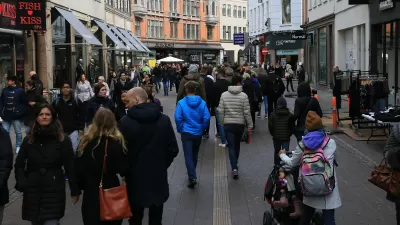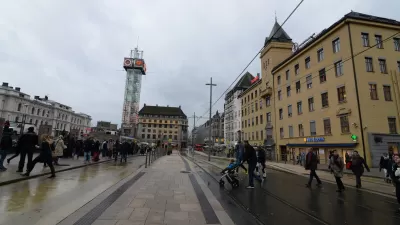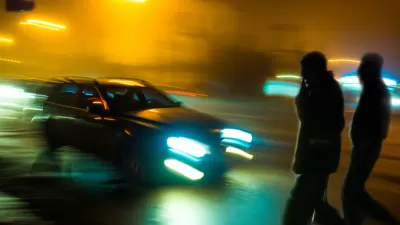Many streets and cities are designed for vehicles instead of for pedestrians. But policies and programs in cities around the world, and even in the United States, might be signaling a shift in priorities.

Richard Conniff takes a look at recent efforts to make cities better places for pedestrians. In Europe, car restrictions and bans are planned or have been instituted in Oslo, Madrid, and Paris, even in the face of public opposition, he says:
Yes, car owners are furious. That's because they have mistaken their century-long domination over pedestrians for a right rather than a privilege. The truth is that cities are not doing nearly enough to restore streets for pedestrian use, and it's the pedestrians who should be furious.
In the United States, the notion that streets are for cars is exemplified by level of service standards based on vehicle throughputs. The result is increased air pollution, more expensive cities, and streetscapes that are not conducive to more sustainable modes of travel. "Urban walking has thus deteriorated from a civilized pleasure to an overheated, unshaded, traffic-harried race to a destination," laments Conniff.
Still, he points to examples of change happening at the grassroots level, including the Walk [Your City] program, which promotes wayfinding and walkability, and the Better Block Foundation, an organization that helps communities with placemaking and neighborhood development projects.
"In many of the major cities of the world, it has begun to dawn even on public officials that walking is a highly efficient means of transit, as well as one of the great underrated pleasures in life," says Conniff.
FULL STORY: The Pedestrian Strikes Back

Maui's Vacation Rental Debate Turns Ugly
Verbal attacks, misinformation campaigns and fistfights plague a high-stakes debate to convert thousands of vacation rentals into long-term housing.

Planetizen Federal Action Tracker
A weekly monitor of how Trump’s orders and actions are impacting planners and planning in America.

In Urban Planning, AI Prompting Could be the New Design Thinking
Creativity has long been key to great urban design. What if we see AI as our new creative partner?

How Trump's HUD Budget Proposal Would Harm Homelessness Response
Experts say the change to the HUD budget would make it more difficult to identify people who are homeless and connect them with services, and to prevent homelessness.

The Vast Potential of the Right-of-Way
One writer argues that the space between two building faces is the most important element of the built environment.

Florida Seniors Face Rising Homelessness Risk
High housing costs are pushing more seniors, many of them on a fixed income, into homelessness.
Urban Design for Planners 1: Software Tools
This six-course series explores essential urban design concepts using open source software and equips planners with the tools they need to participate fully in the urban design process.
Planning for Universal Design
Learn the tools for implementing Universal Design in planning regulations.
Gallatin County Department of Planning & Community Development
Heyer Gruel & Associates PA
JM Goldson LLC
City of Camden Redevelopment Agency
City of Astoria
Transportation Research & Education Center (TREC) at Portland State University
Jefferson Parish Government
Camden Redevelopment Agency
City of Claremont




























